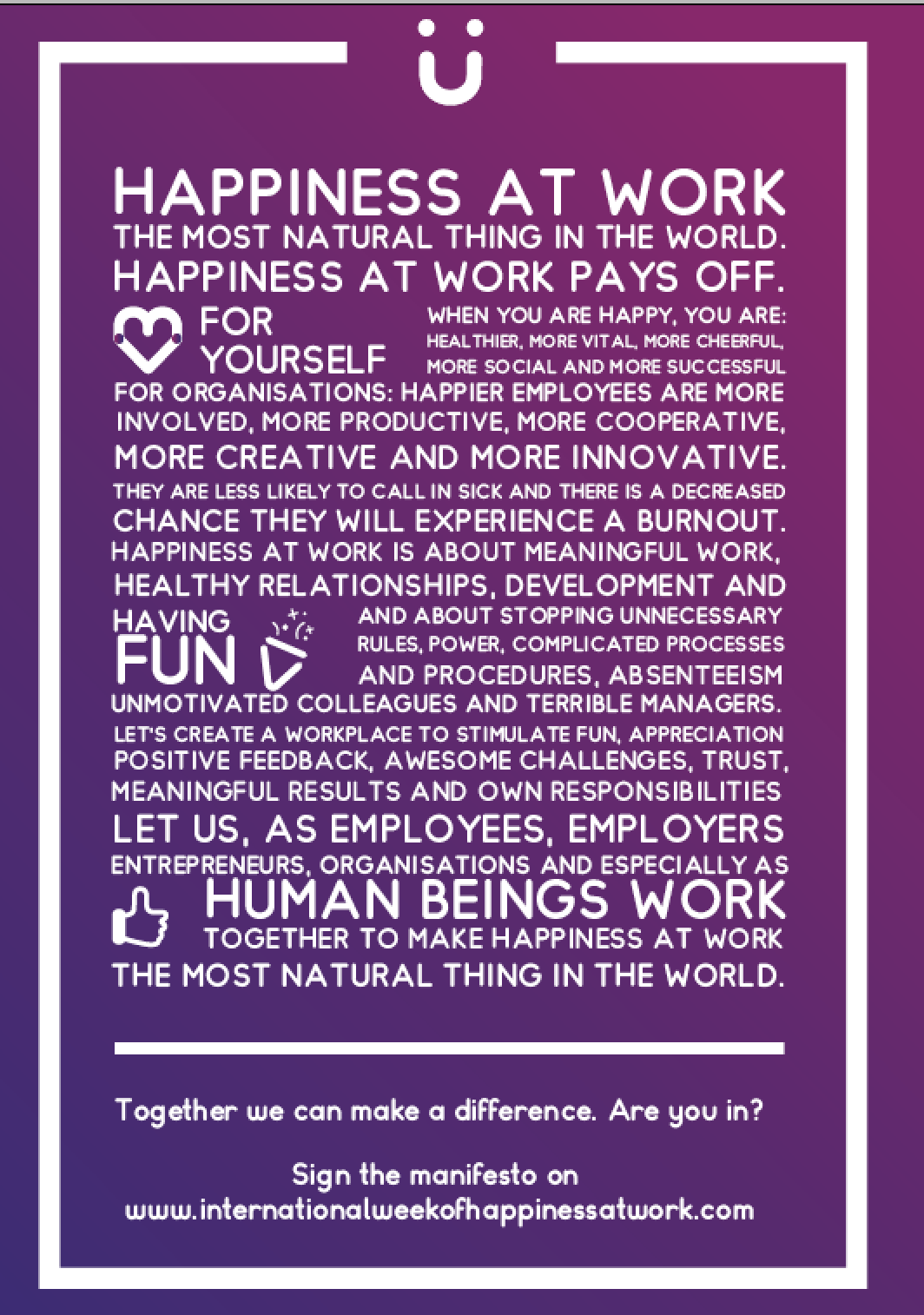Cultivating Happiness at Work
As human beings we have an intrinsic, innate desire to be happy. In modern Western society, we typically spend half of our waking lives at work (at least for 5 of every 7 days). Happiness at work is therefore critical to our overall state of happiness and wellbeing, yet this is something we too often overlook.
It’s simple: when people are happy at work, they are better people (friends, parents, neighbours, community members). If more people were happy at work then the world would be a better place. International Happiness at Work Week (25th-29th September) was launched in 2018 to spread this message as far and wide as possible.
You can read, download and sign their manifesto.
Why is happiness at work so important?
Above all, employers have a duty of care for their employees. Ignoring for a second the plethora of benefits for the employer (that we will explore below), ensuring their employees are happy at work should be any employer’s number one priority. People who are happier at work are happier in all aspects of their life. As a society this is something we should strive for more than anything, and employers can certainly play their part.
The greatest asset to any business is its people; ensuring employees are happy at work is undeniably crucial to the success of any organisation. Without happy and committed staff who keep the cogs turning, most businesses would fail to thrive and without the ability to thrive most would simply cease to be.
Happy employees have such a strong impact on your business because they:
interact better with customers
build better relationships with colleagues
are less likely to quit or take sick leave
are more engaged, creative, innovative, flexible, productive (University of Warwick)
Happiness and positivity rubs off on others too, harnessing a more positive and collaborative work culture.
How to cultivate happiness at work
Here are some simple ideas offered by the team at International Happiness at Work Week:
invite an expert to give an inspirational talk over lunch and discuss what you can do
organise a discussion about what makes you happy at work with colleagues
talk to management about what they can do to make this a happier workplace
start an initiative to give more positive feedback
play a game to get to know each other better, like Personality Poker or the Choose Happiness at Work game
organise drinks with your colleagues
eat lunch together and not at your desk
talk about your organisational culture and how you can make changes
write a team manifesto
One silver lining from the COVID pandemic has been the increase in remote and hybrid working. Such arrangements, along with alternative working hours, is the kind of flexibility that many employees now demand, and so are increasingly important in ensuring happiness at work. Generating a culture of inclusivity is also crucial to happiness at work (something we will discuss in more detail in our next article), with employees able to feel comfortable in their own skin and perform at their best levels.
How we can help…
At 87% we advocate for measurement as the all-important first step for cultivating happiness at work. Without a baseline measure of employee wellbeing, you’re flying blind when it comes to wellbeing initiatives (such at those in the above list) and boosting happiness at work; you simply won’t know what is and isn’t working.
With our Employee Wellbeing Platform, you can harness tangible wellbeing data from employee self-assessment and uncover which audiences are the most unhappy, with tailored recommendations for ways to boost happiness and improve workplace culture. You will learn which areas of the business would most benefit from wellbeing initiatives and how to use data to track their success. We allow employee happiness to be tied into KPIs with correlations possible over time, while comparisons across teams serves to motivate managers to be more involved and to actively boost happiness across their team(s).
Our Mental Fitness App also empowers employees to take charge of their own mental health, equipping them with the tools and resources to boost their happiness at work.
Closing remarks
It is in the employer’s best interests, legally, morally and commonsensically, to boost the happiness of their employees. When employees are happier, they perform better and make any business more successful. They also lead happier lives outside of work and become better members of society.
There are so many things businesses can do to improve employee happiness, and reap the rewards!
See further reading on happiness at work.




